|
|
|
Sort Order |
|
|
|
Items / Page
|
|
|
|
|
|
|
| Srl | Item |
| 1 |
ID:
095515
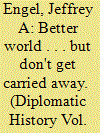

|
|
|
| 2 |
ID:
116465
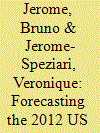

|
|
|
|
|
| Publication |
2012.
|
| Summary/Abstract |
Since 2008, the economic fallout from the subprime mortgage crisis has led to the defeat of a number of incumbents in the world's major democracies. For instance, in the former EU-15, eight countries (including France) have ousted their incumbents in favor of new leaders. The United States is no exception, and the 2012 US presidential election will see Barack Obama running for a second term during difficult economic times. After hitting a high of 10% in October 2009, the nation's unemployment rate decreased to 8.2% in May 2012. Nonetheless, this is still 0.7 percentage point higher than what Ronald Reagan faced in 1984 or what confronted George H.W. Bush in 1992 as they ran for their second terms. Looking at measures of presidential popularity for the month of May since 1980, Barack Obama's approval rating is at 46% in the Gallup polls, which is the third-worst rating after George W. Bush (30% in 2008) and George H.W. Bush (39.4% in 1992). Given Barack Obama's approval rating and the current national unemployment level, must we conclude that Barack Obama is irremediably on the ropes against Mitt Romney in 2012?
|
|
|
|
|
|
|
|
|
|
|
|
|
|
|
|
| 3 |
ID:
106709
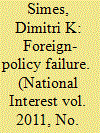

|
|
|
| 4 |
ID:
095994
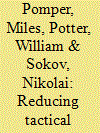

|
|
|
|
|
| Publication |
2010.
|
| Summary/Abstract |
US and Russian leaders have indicated that the next round of US-Russian strategic arms negotiations, after a START follow-on treaty is agreed and ratified, is likely to tackle non-strategic, or 'tactical', nuclear weapons. Control of such weapons has remained elusive, despite the fact that they are particularly attractive to terrorists and present a greater risk than strategic weapons of early or accidental use. In 1991, US President George H.W. Bush and Soviet President Mikhail Gorbachev made parallel, but unilateral, pledges - collectively known as the presidential nuclear initiatives - to reduce the numbers of their tactical nuclear weapons and store the larger part of their arsenals in central storage (which was not defined). Washington, however, did not accept a Soviet proposal made that autumn to negotiate a legally binding, verifiable treaty. The two countries have made much progress towards meeting their initiative commitments, but there have been no further serious negotiations on the issue despite many rounds of strategic arms reduction talks. The intention of US and Russian officials to finally tackle the issue of tactical nuclear weapons is welcome, yet linking the two classes of nuclear weapons at an early stage in the next round of post-START negotiations might result in more problems than it can solve.
|
|
|
|
|
|
|
|
|
|
|
|
|
|
|
|
| 5 |
ID:
095516
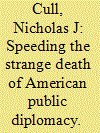

|
|
|
|
|
| Publication |
2010.
|
| Summary/Abstract |
The Reagan administration knew how to throw a great party, and the celebration held on November 17, 1988, in the Organization of American States building in Washington, DC, was no exception. Stretch limos jammed that part of town. Guests included media mogul Rupert Murdoch and the president himself. The gala dinner honored the achievement of Charles Z. Wick, who had served throughout the Reagan years as director of the U.S. Information Agency (USIA).1 Originally established by Eisenhower in 1953, USIA conducted the U.S. government's public diplomacy: advancing foreign policy by engaging foreign publics through radio, press work, exhibitions, publications, cultural exchanges and a host of other channels. Wick's achievement was impressive. USIA had been a key part of the Reagan era's ideological barrage against the Soviet bloc, telling the world about the shooting down of the Korean airliner KAL 007, telling the people of the Soviet Union about the meltdown of Chernobyl, and mobilizing just enough European sympathy to allow the deployment of Pershing missiles. USIA was also part of the emergence of a new political order in Eastern Europe, conducting all manner of exchanges with the Gorbachev regime, and encouraging the voices of reform. The momentous political changes in Eastern Europe during the following year seemed to bear out the message of that November night: that USIA and public diplomacy were now central to American foreign policy. Yet the Reagan/Wick era of public diplomacy did not last. In 1999, USIA was absorbed into the State Department and public diplomacy thereby placed on a back burner.
|
|
|
|
|
|
|
|
|
|
|
|
|
|
|
|
| 6 |
ID:
113129
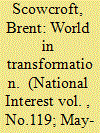

|
|
|
|
|
| Publication |
2012.
|
| Summary/Abstract |
THIS SPECIAL issue of The National Interest is particularly timely because we are living in a world that we know and that has shaped our thinking, but that world is in a process of transformation. We are struggling with institutions and practices of an Old World when that Old World is fading. This issue explores this global transformation, and I commend to you the articles contained here under the rubric of the "Crisis of the Old Order."
|
|
|
|
|
|
|
|
|
|
|
|
|
|
|
|
|
|
|
|
|